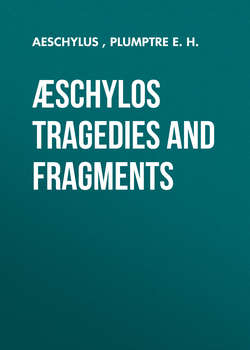Читать книгу Æschylos Tragedies and Fragments - Эсхил, Aeschylus - Страница 1
PUBLISHER'S NOTE
ОглавлениеThe reception accorded to the pocket edition of Dean Plumptre's “Dante” has encouraged the publishers to issue in the same format the Dean's masterly translation of the Tragedies of Æschylos.
In preparing the present issue they have followed the carefully revised text of the second edition, and have included the scholarly and suggestive annotations with which the Dean invariably delighted to enrich his work as a translator.
The seven Plays, which are all that remain of the seventy or eighty with which Æschylos is credited, are presented in their chronological order. Passages in which the reading or the rendering is more or less conjectural, and in which, accordingly, the aid of the commentator is advisable, are marked by an asterisk; and passages which are regarded as spurious by editors of authority have been placed in brackets.
In translating the Choral Odes the Dean used such unrhymed metres – observing the strophic and antistrophic arrangement – as seemed to him most analogous in their general rhythmical effect to those of the original. He added in an appendix, however, for the sake of those who preferred the rhymed form with which they were familiar, a rhymed version of the chief Odes of the Oresteian trilogy. Those in the other dramas did not appear to him to be of equal interest, or to lend themselves with equal facility to a like attempt. The Greek text on which the translation is based is, for the most part, that of Mr. Paley's edition of 1861.
A translation was also given of the Fragments which have survived the wreck of the lost plays, so that the work contains all that has been left to us associated with the name of Æschylos.
In the present edition a chronological outline has been substituted for the biographical sketch of the poet, who from his daring enlargement of the scope of the drama, the magnificence of his spectacular effects and the splendour of his genius, was rightly honoured as “the Father of Tragedy.”
